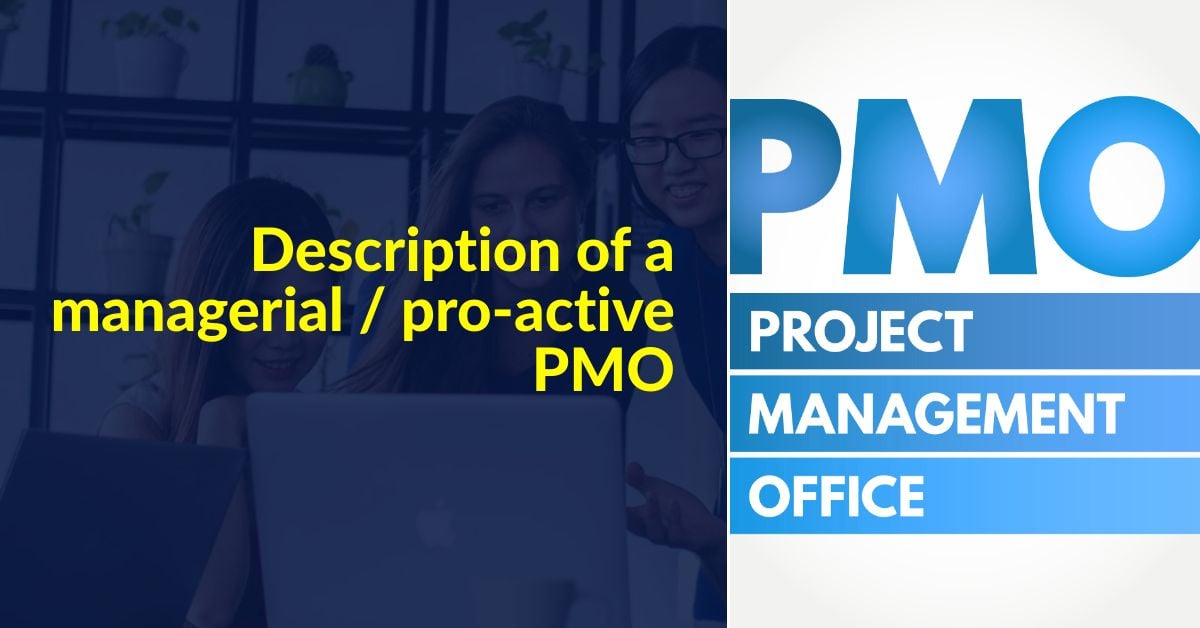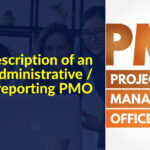The last post dealt with the definition of the reporting PMO. This is the one most senior managers have experienced and unfortunately has the perception that it is purely consolidating data and adding little value, hence it is usually staffed by junior resources.
At the other end of the spectrum is a managerial / pro-active PMO.
This type of PMO will usually provide all of the services of a reporting PMO and additionally any number of the following:
- Review and challenge project reporting
- Trend analysis (i.e. identifying common themes impacting project delivery)
- Coaching / Mentoring
- Interpret strategy / mobilise / shape programme
- Actively manage risks / issues / cross dependencies
- Actively manage the delivery of milestones
- Actively manage benefit realisation
- Actively manage costs including allocation and cost recovery models
- Define project methodology for use on the programme
- Recruit and own programme and project managers
- Provide recommendations to senior management on remediation action
As you can see many of the activities listed above require a high wide range of skills. It is for this reason that this type of PMO will need to be resourced with a number of experienced practitioner’s who have experience of managing a PMO and ideally many years experience of delivering projects and programmes.
The project delivery experience is important for 2 reasons:
- Experience will allow problems to be identified early and interventions to be made.
- Without experience the PMO will find it hard to gain the respect and trust of the project and programme managers
Review & Challenge Project Reporting
This is an important step. The project report should be the point in time where the project manager thinks about the project (what has been achieved, what still needs to be done, financials, risks, issues) so as to come up with an accurate status of the project. This is the primary tool that is used to communicate status and successes to internal and external stakeholders.
It is a shame that most project managers, even experienced ones do not understand the value.
By setting up a regular review session the PMO can be build a good working relationship with the project manager, help them to identify potential risks, work through any issues / barriers and ensure that report accurately represents the status of the project.
When this works well it is very powerful and results in a higher degree of positive outcomes.
Trend Analysis
A common fault laid at the door of the PMO is that they collect a lot of data but then it is unclear what they do with it. Trend analysis of costs, benefits, deliverables, resourcing, etc is critical. These are all key indicators of the health of the underlying projects and programmes.
The PMO needs to instil robust processes to collect accurate data (usually monthly) so that indicators can be created to measure trends. For example, if your are running under budget month on month this usually implies that resources are not being added quickly enough meaning all the work is not being completed to achieve milestones and associated benefits. Using a combination of these trends allows cross validation to confirm findings.
It is important the data is correct and a seasoned PMO professionally will quickly spot where a project manager is simply redistributing original cost and headcount estimates over the remainder of the project (back loading the project). In the majority of cases the resources will never be recruited.
Trend analysis also allows for management decisions to be made about releasing budget that will not be used for use by other projects (definitely in the good corporate citizen box).
Trend analysis is powerful as it allows senior management to quickly understand the position and causes of the problem so that action can be taken.
Active Management Risks / Milestones / Benefits / Costs
These items are very much covered by the 2 points above. However, I will add a couple more big value adds:
- Identifying common themes across risks and issues and then resolving centrally through the PMO. You will win a lot of friends within the project managers for making their life easier.
- Managing cross dependencies. As the central PMO you will build a good insight to cross dependencies. By managing cross dependencies, keeping all stakeholders informed, etc you will help avoid problems. Again the project managers will be very pleased.
Interpreting Strategy / Mobilising / Shaping Programme
Not many PMO’s have the skill or are given the opportunity to do this. However, in my mind, every company should want this type of PMO.
In most organisations, senior management set the strategy and then it is hit or miss how this is interpreted and translated into projects for implementation. A good managerial PMO can take the strategy, interpret this into the different streams of work, identify stakeholders, sponsors projects managers, mobilise the workstreams and then manage against the strategy (this includes capturing and interpreting the impacts where the strategy changes).
Define / Own Project Methodology
The PMO is the perfect owner of the project methodologies to be used in an organisation. If it is staffed by the right type of resources they will be able to define and implement a set of tools and processes that are pragmatic and fit for purpose. As they are working with the project managers they can make sure that the tools and processes are understood and embedded into each project.
A good PMO will constantly review tools and processes and refine over time. This includes engaging project managers and wider stakeholders for constructive feedback.
The power of a common methodology is that all projects in an organisation should be executed to the same level of quality resulting in a higher certainty on outcomes. It also allows for resources to be used across the organisation without having to learn / use a different methodology.
Recruit / Manage Project Managers
In some organisations, the PMO is asked to interview and recruit project managers as they have the best understanding of the skills required to deliver projects. This can even mean that the project managers report to the PMO who then assign them to work on different projects across the organisation. This is great for consistency but does sometimes cause issues with the project sponsor.
Coaching / Mentoring
This is an important for any organisation wishing to up skill their project management capability. New / junior project managers should be appointed a mentor in the PMO to help them learn the skills of being a project manager. Too many organisations make a good line manager a project manager and then give no support or training. Some adapt well, many do not – the skills are different.
A PMO can coach all PMO’s (and sponsors). This is far more delicate as many are more senior and believe that they know how to do the job.
Recommendations
A good PMO should not be simply presenting data. They should be reviewing, analysing, cross checking so that they can either take the appropriate action or provide management with recommendations to make informed decisions. The PMO must take ownership and responsibility for what they are managing so as to ensure everyone is successful.
Conclusion
This is only a quick fly through of the dimensions of a Managerial PMO but hopefully you have a good understanding of how this is very different from a reporting PMO and most importantly, the considerable value that it adds.


